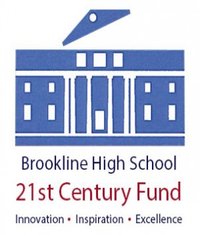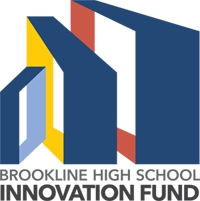
First, came a tragedy. In 1980, Andrew Warren Lurie, a Brookline High School graduate in his freshman year at the University of Chicago, died of an infection at school.
Years later, his parents, Bob and Syrul Lurie, came to Bob Weintraub, the headmaster of the high school, and explained that they wanted to create a memorial space at the high school in Andrew’s honor. They offered to pay to construct and furnish a beautiful library — named for Andrew — in School Within a School (SWS), which Andrew had attended.
The question was: could a public school use private money to do this kind of project? The Luries and Weintraub cited endowments for public colleges and universities as examples of spending private money for public institutions. The superintendent of schools, James Walsh, and the school committee supported the idea.
The Andrew Lurie Library exists to this day. And the project had an added effect: it sparked an idea. Weintraub recalls Andrew’s father, the late Bob Lurie, saying, “You know, if we can raise money for a room, we can probably raise private money for other stuff you need, Bob.”
A team from BHS visited the Boston Latin School and spoke with the headmaster, Mike Contompasis, and the school’s very sophisticated development team. Boston Latin actively solicited and cultivated their alumni — which included some very prominent and generous folks — and had built a multi-million dollar endowment. The Brookline team left Boston Latin saying, “We can do this.”
As this idea was germinating, two renowned senior teachers at the high school – Margaret Metzger and Gayle Davis — approached Weintraub to tell him that they were nearing retirement, and felt a need to create ways for seasoned staff to ease the entry for newcomers. Long story short, the plan for “Teachers Mentoring Teachers” was born. The teachers would be released from one of their classes so they could devote time to developing and running it, and their professional lives would be enriched. It wouldn’t be very expensive. Weintraub figured it would cost around $25,000. But that was money he didn’t have.
So he spoke with Bob Lurie and another prominent BHS grad and Brookline citizen, Arthur Segel, and a team began to coalesce around a goal — starting a private, non-profit foundation to support innovation at the high school. The Brookline Education Foundation already existed and was widely beloved for the awards and recognition it gave teachers — but its grants tended to be small.
“This was a very different idea,” Weintraub says. “This was to do big stuff, in the spirit of Brookline’s innovative history.”
“Local Solutions to National Education Challenges” became the mantra that defined the project. Brookline High would address important educational problems and develop compelling programs that, if validated, could be disseminated nationally. “Through this foundation, we can improve public education and simultaneously polish the mystique of Brookline High,” Weintraub argued.
After copious work by Lurie, Segel, and others, the Brookline High 21st Century Fund was launched with a gala in December 1998 at the home of a team member. The launch featured a star-studded list of speakers who graduated from Brookline High, including Mike Wallace, Mike Dukakis, Conan O’Brien, and Bob Kraft. More than 50 donors attended and kicked in $10,000 each. With $550,000 in hand, the “BHS 21st Century Fund” was born.
The Fund didn’t have much structure at the beginning, Weintraub says; it tended to generate ideas informally, focusing on problems and how to solve them. Teachers Mentoring Teachers was the first program and proof of concept. It was evaluated and validated, research conducted on the program was published in prominent national educational journals, and the program leaders — Margaret Metzger and Gayle Davis — presented to school systems across the country. Both Metzger and Davis acknowledged that their engagement with the program prolonged their careers at Brookline High by many years.
The Fund — now known as The BHS Innovation Fund — is celebrating its 20th anniversary. It has created 15 programs, including the nationally significant African-American and Latino Scholars Program, the Social Justice Leadership Program, and BHS Tutorial.
The Tutorial Program, which has also received national recognition, began with a research project. Weintraub saw that the only academic support/tutoring available at The High School was through the special education program. The “experiment” removed 40 students — the experimental group — from the special education Learning Centers and placed them with regular classroom teachers for tutoring. Forty other students — the control group — with similar academic profiles remained in the Learning Centers. The format for the services was the same — five students met with a tutor every day for one class period. Data was gathered over two years.
The results demonstrated that for students with mild learning issues, tutoring with regular classroom teachers — math, social studies, world languages, and science — was more successful in terms of academic data. Students in The Tutorial Program also reported feeling better about going into a mainstream classroom than a special education classroom.
For teachers, the program provided some professional variation, working with a small group of students in a different way, once a day. And for parents, it offered tutoring that they could not afford otherwise. Good for students; good for teachers; and good for parents.
In 2017, the Fund’s name was changed to the Brookline High School Innovation Fund, to more accurately reflect its mission. As it celebrates its 20-year anniversary, this mission continues to be not only relevant, but also paramount in supporting Brookline High School students as they enter today’s world.
Some of the recently hired teachers have had little teaching experience, yet the school has consistently been highly ranked; US News and World Report stated it is 23rd in Massachusetts in 2013.
Headmaster Deborah Holman said the school, when hiring, focuses on the quality of the teaching by prospective teachers.
“We aim to hire the best teacher who is the best match for that program and that teaching position at the time.” She said that experience can range from one year to 20. “You have to think about the composition of the department already. Does the department have a bunch of folks in their 40s and older, and you want to bring in someone in their 20s, just to do some balancing?”
Holman said high-quality teachers can have varying degrees of experience.
“Sometimes a quite together, thoughtful, new teacher who maybe has one year of experience shows a ton of promise,” Holman said. “We might make a decision to say that’s worth it for us, because this person brings these different characteristics. Therefore, the department head would have to commit to supporting that person very, very heavily if they’re new to the teaching profession as well as new to Brookline High School.”
Mathematics Curriculum Coordinator Joshua Paris said his department’s hiring process, which he said resembles that of the other departments, starts with posting a position’s availability on the website SchoolSpring. He then goes through the applicants and chooses 10-15 out of 50-60, on average, to be reviewed by a committee of four to five teachers and himself.
The committee, according to Paris, then selects five to 10 teachers to interview, and to four of the remaining teachers usually asked to teach a class at the school. In the past, Paris said, he has seen videos of teachers or gone to visit them if they could not come to the school.
Holman said she wants to always be available to observe these teaching sessions because she will have a fresh perspective on the candidate, whom the hiring committee already knows from his or her interview and resume.
One or two of the candidates are chosen to be interviewed by Holman in the final step of the decision process, according to Paris.
“I won’t repeat the interview that the department interview committee had. I want to converse with the person and find out why they’re interested in Brookline High School specifically, who they are as a
person. I’ll talk to them about favorite books that they read, things in education that they’re particularly interested in,” Holman said. “I’m asking questions to see if they are a reflective teacher, or if my sense is that they think they have all the right answers.”
She also says she wants to get a sense of their teaching, the way they interact with kids, and their overall personality. She often asks about past situations.
Paris said he looks for regional, ethnic and experiential diversity when he hires teachers.
“I think more experienced teachers and newer teachers have different things to offer the school. I like to create a balance of those,” Paris said. “I might look at what type of person I think could enhance the department. Do they have a perspective that we don’t necessarily have that might push us in a certain direction?”
The school offers the Teachers Mentoring Teachers program to teachers new to Brookline, according to Paris. The program is currently run by math teacher Meghan Kennedy-Justice and social studies teacher Robert Grant. The program has new teachers discuss their experiences. In addition, they are given teacher mentors and they observe other teachers’ classes.
Holman said the program was created by the 21st Century Fund in the late 1990s.
“It was the idea of how you can get new teachers who come into the high school acclimated and oriented to not just teaching in a classroom, but the Brookline High School and Brookline community culture,” Holman said.
According to English Curriculum Coordinator Mary Burchenal, not all teachers are eligible for the program. Teachers who teach less than half-time and long-term substitutes who are not at the school for a full year are not included in the program. She said these teachers may have unofficial mentors, although overall, they do get less support.
Burchenal said this is a difficult place to be a new teacher.
“There are a lot of really great teachers here. Kids have high expectations, parents have high expectations, department heads have high expectations, colleagues have high expectations,” she said. “Although everybody is very understanding of a new teacher’s dilemma, that doesn’t change the fact that it’s still a challenge every day to plan every day, teach every day and have all these expectations surrounding you.”
Holman said she looks to hire teachers who strive to self-improve.
“If you get, collectively, a teaching staff, which we do not have, that is pretty self-satisfied, that’s not a lot of fun,” Holman said.
She said she will not hire a teacher who is not open to feedback from others or is not willing to help all of his or her students.
“Every kid who shows up in your classroom in September, regardless of who they are, what strengths and challenges they have, where they’re from, you support all of those kids,” she said.
Paris said there are benefits to hiring both new and experienced math teachers.
“To be a good teacher is a mix of an inherent energy and passion that you have for teaching, for math and for working with teenagers. Starting from there, I think high-quality educators learn how to take those ideals and implement them in the classroom. An experienced teacher has already figured out how to do that,” Paris said. “Their classroom management skills are usually excellent. The way they write lessons is well-defined. Newer teachers have to learn that, because that comes from experience, but what you get is that idealism and energy that I want all of our teachers to have.”

